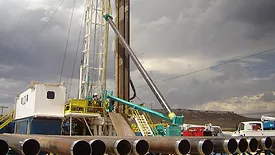J.J. Smith
J.J. Smith is a contributing editor and DC Correspondent for The Driller. He can be reached at josephjsmith749@gmail.com.
ARTICLES
Geothermal Technologies Office awarding $200,000 to projects under ‘Phase I’ funding
Read More
EPA’s National Drinking Water Advisory Council Sets Meeting
NDWAC schedules virtual meeting for Jan. 10, 2025
Read More
Senators and Witnesses Are Split on PFAs Control
Support for 'responsible management’ of PFAS that meets industrial needs while reducing exposure to those chemicals
Read More
EPA Implements Free PFAS Testing for Small-Community Water Suppliers
Scientists urges EPA to test drinking water for other emerging contaminants
Read More
Federal Government Allocates $974M for 82 Western Water Projects
Department of the Interior announces funds for water recycling projects and to revitalize aging water systems
Read More
EPA Forming Panel to Regulate Perchlorate in Drinking Water
EPA plans to issue a proposed NPDWR for perchlorate by November 2025 and a final regulation by May 2027.
Read More
EPA Drafts Rule to List PFAS on Registry of Toxic Substances
Stricter requirements to report PFAS substances also proposed by EPA
Read More
Senators Urge IRS to Change Rule that Prevents Geothermal Stakeholders from Claiming Tax Credit
Senator Michael Bennet has submitted a letter to the Department of Treasury asking it to modify a tax rule.
Read More
Geothermal Tech that Accesses Rock at 300°C Likely Within Ten Years
Rock heated to 300°C can produce ten times the amount of electricity currently produced
Read More
Advancing Geothermal Drilling Technology is Focus of DOE Research Agency
Need to develop drilling equipment that works at near 400°C
Read More
Dig deeper into the drilling and water supply industry!
Build your knowledge with The Driller, covering the people, equipment and technologies across drilling markets.
SIGN UP NOWCopyright ©2026. All Rights Reserved BNP Media.
Design, CMS, Hosting & Web Development :: ePublishing



.webp?height=168&t=1734839470&width=275)
.webp?height=168&t=1733557798&width=275)




